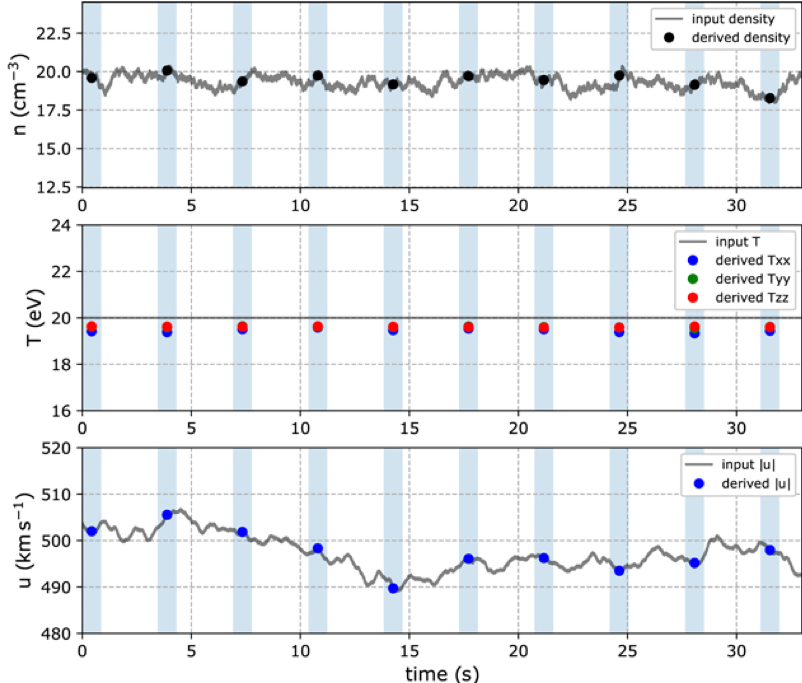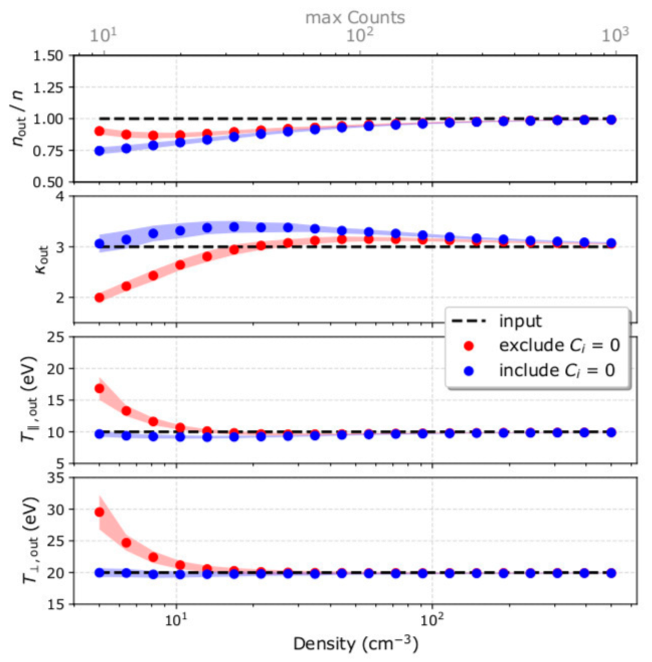MIST
Magnetosphere, Ionosphere and Solar-Terrestrial
Evaluating the Accuracy of Solar Orbiter Plasma Measurements
By Georgios Nicolaou (MSSL, UCL)
The plasma instruments on board Solar Orbiter will determine the three-dimensional velocity distribution functions of the plasma ions and electrons with high time resolution, within heliocentric distances from ~0.3 to 1 au. The analysis of these distributions will determine the plasma bulk parameters (e.g., density, velocity, and temperature). New work by Nicolaou et al. (2019, 2020) assesses the accuracy of these measurements, considering the proton and electron instruments separately.
1. The Impact of Turbulent Solar Wind Fluctuations on Proton Measurements
The Solar Wind Analyser’s Proton Alpha Sensor (SWA-PAS) on board Solar Orbiter will measure solar wind plasma protons. However, due to the dynamic and turbulent nature of solar wind plasma, the accurate determination of the plasma parameters from the observations is significantly challenging. Nicolaou et al. 2019, simulated turbulent solar wind proton plasma that exhibits the typical features of turbulence spectrum. They modelled the expected observations by SWA-PAS (see Figure 1) and analyzed them using standard analysis methods in order to quantify the accuracy of the derived plasma bulk parameters. The results show that the typical turbulence will not significantly affect the accuracy of the high-time resolution measurements by SWA-PAS. In addition, the authors compare the accuracy of the instrument as a function of the acquisition time and discuss the sources of errors in the derived parameters.

Figure 1. Time series of modeled solar wind with a turbulent spectrum consisting of Alfvén waves and slow modes and a comparison to derived moment parameters from the expected SWA-PAS observations at lower resolution. Each panel shows the input data (gray line) and the moments derived from the modeled observations (bullets). The shadowed areas represent the time intervals in which the instrument collects counts to construct an entire 3D VDF. The top panel shows the plasma density the middle panel shows the diagonal elements of the plasma temperature tensor, and the bottom panel shows the plasma bulk speed. Besides the small systematic underestimation of the plasma density and plasma temperature, the derived moments suggest that the accuracy of SWA-PAS measurements, under typical turbulent solar wind conditions, is remarkably high.
2. Determining the Bulk Parameters of Plasma Electrons from Pitch-Angle Distribution Measurements
The Solar Wind Analyser’s Electron Analyser System (SWA-EAS) is designed to observe the solar wind electrons. In burst-mode operations, the instrument will obtain measurements in the 2D velocity space (as opposed to full 3D velocity distributions) in order to construct the pitch angle distributions of plasma electrons. The reduction of one dimension reduces the statistical significance of the observations and makes the analysis more challenging. Nicolaou et al. 2020, investigate the expected accuracy of the derived bulk parameters of supra-thermal electrons, which are often described by kappa distribution functions. They simulate the expected observations within the heliocentric distance range from 0.3 to 1 au and derive the plasma bulk parameters by fitting the synthetic observations (see Figure 2). The study shows that the proper fitting analysis of the measurements can derive the plasma parameters with significant accuracy, even at 1 au, where the expected particle flux is very low.

Figure 2. (From top to bottom) The derived electron density over input density, kappa index, parallel and perpendicular temperature as functions of the input plasma density. The red points represent the mean values (over 200 samples) of the parameters derived by fitting only the measurements with Ci ≥ 1. The blue points represent the mean values of the parameters derived by fitting to all measurements including those with Ci = 0. The shadowed regions represent the standard deviations of the derived parameters. The dashed lines represent the input parameters.
For more information, please see the papers:
Nicolaou, G., Verscharen, D., Wicks, R. T., & Owen, C. J. (2019). The Impact of Turbulent Solar Wind Fluctuations on Solar Orbiter Plasma Proton Measurements. The Astrophysical Journal, 886:101. https://doi.org/10.3847/1538-4357/ab48e3
Nicolaou, G., Wicks, R., Livadiotis, G., Verscharen, D., Owen, C., & Kataria, D. (2020). Determining the Bulk Parameters of Plasma Electrons from Pitch-Angle Distribution Measurements. Entropy, 22, 103. https://doi.org/10.3390/e22010103